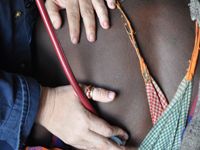Mama Daktari
Posted: May 13, 2014
Tonya Hawthorne, DO, ’92, came to KCOM with one goal: to become a missionary physician. Since then, she’s worked in war zones, refugee camps, tsunamis, volcano eruptions, earthquakes, and city dumps. She’s traveled the globe saving lives, and now deep in the Kenyan bush, she’s establishing clinics in the most remote locations.
As a medical student, Dr. Hawthorne embarked on her first outreach trip to the Dominican Republic. The experience opened her eyes and further solidified her passion for medical missions. Knowing she could really make a difference, she hoped to one day open clinics around the world.
In 1997, Dr. Hawthorne founded New Frontiers Health Force, an organization dedicated to developing international health centers, medical outreaches, and community education programs. The organization began setting up temporary clinics around the world, moving to different, and often dangerous, locations each month. After reevaluating her goals for the organization and why she chose mission work, Dr. Hawthorne knew temporary clinics weren’t enough. She needed to establish permanent clinics. Her first stop was Kenya. In a very remote village called Ngoswani, she found a total of five buildings, no running water, no electricity, and no education.
“I thought to myself, ‘Wow, I could really make an impact here,’” Dr. Hawthorne recalls.
Since opening the clinic in 2009, it has grown to serve more than 10,000 Masai people and includes immunizations for children, HIV treatment, TB and malaria treatment, 24-hour trauma care, pharmacy, laboratory testing, prenatal, obstetrics, and gynecology.
“I’m so glad the diagnostic skills I learned at KCOM have not faded away in my practice,” says Dr. Hawthorne, who is known as Mama Daktari—madam doctor—to the Swahili-speaking villagers. “I learned I needed to rely on examining and looking at my patients.”
Her organization focuses on education, too. Since location often determines a child’s education in Kenya, New Frontiers provides the foundational education necessary for local children to attend primary school. Additionally, the organization helps fund students’ education through high school graduation.
Dr. Hawthorne believes education is the best way to make a lasting impact on the Masai, who are known for their strong cultural identity. They hold their traditions close, including the more extreme rituals like female circumcision, which she strongly educates against.
Because the Masai also place great significance on childbirth, Dr. Hawthorne educates their traditional birth attendants so they will send pregnant women to her clinic early—not when they are in trouble. This approach helps her overcome her biggest challenge, which is getting patients to her clinic before their conditions become too advanced. With rough terrain and wild animals, traveling to the clinic is risky, especially at night.
“I thought to myself, ‘Wow, I could really make an impact here.’”
Regardless of all she’s seen, she still gets nervous when she hears middle-of-the-night knocks for help. One night, she rushed to the clinic to find a young woman in a breached delivery. Knowing breached deliveries are seldom successful, she quickly started Pitocin for the contractions, grabbed the two blue feet, and said a prayer. Within minutes, a blue baby flopped onto her table.
Remembering the previous summer when she had four fetal deaths in a row, she was determined to bring this baby to life.
“Not today,” Dr. Hawthorne said to herself as she hurriedly began resuscitating the newborn.
Suddenly, she heard a weak little cry.
Often given the privilege of naming the babies she delivers, Dr. Hawthorne named the baby Miracle. She knew years ago when she first came to KCOM, someday, somewhere, a miracle was waiting to happen, and she was going to be a part of it.
Through all the challenges and excitement, she remains passionate for her work. In October 2013, Dr. Hawthorne opened her second clinic in Kenya. In a village called Empaash, the clinic is 2½ hours further in the bush. As she looks to a third site, she knows these clinics will provide care for those who don’t have access anywhere else.
“There really are heroes in this world, but I’m not one of them,” Dr. Hawthorne says. “I’m just doing what I feel I’m supposed to be doing with my life.”